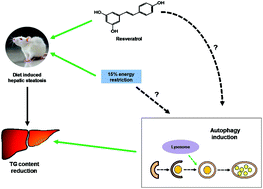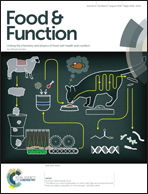Involvement of autophagy in the beneficial effects of resveratrol in hepatic steatosis treatment. A comparison with energy restriction
Abstract
Autophagy eliminates damaged cellular components. In the liver, it has been proposed that it mediates the breakdown of lipid droplets. This study aimed to compare the involvement of autophagy and the oxidative status in the effects of resveratrol and energy restriction as therapeutic tools for managing liver steatosis. In addition, potential additive or synergic effects were studied. Rats were fed a high-fat high-sucrose diet for 6 weeks and then divided into four experimental groups and fed a standard diet: a control group (C), a resveratrol-treated group (RSV, 30 mg kg−1 d−1), an energy restricted group (R, −15%), and an energy restricted group treated with resveratrol (RR). Liver triacylglycerols (TGs) were measured by Folch's method. TBARS, GSH, GSSG, GPx and SOD were assessed using commercial kits. The protein expression of beclin, atg5 and p62, as well as ratios of pSer555 ULK1/total ULK1, pSer757 ULK1/total ULK1 and LC3 II/I were determined by western blotting. Energy restriction increased the protein expression of beclin, atg5 and pSer757 ULK1/total ULK1 and LC3 II/I ratios, and reduced the protein expression of p62, thus indicating that it induced autophagy activation. The effects of resveratrol were similar but less marked than the hypocaloric diet. No differences were observed in oxidative stress determinants except for TBARS, which was decreased by energy restriction. In conclusion, resveratrol can reverse partially dietary-induced hepatic lipid accumulation, although less efficiently than energy restriction. The delipidating effect of energy restriction is mediated in part by the activation of autophagy; however, the involvement of this process in the effects of resveratrol is less clear.



 Please wait while we load your content...
Please wait while we load your content...